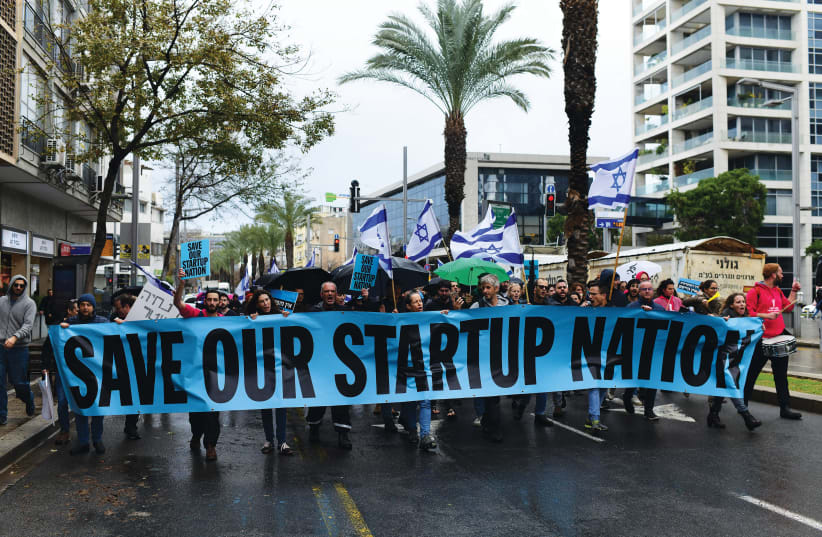Israel’s economy has rebounded significantly following the major economic shocks of the pandemic and Russia’s invasion of Ukraine, but the country still has to address several looming issues such as wage gaps, workforce integration and a troubled real estate market, according to an OECD report on Israel’s economy in 2023.
The report highlights Israel’s relative success in recovering from recent global economic challenges, attributing it in part to a strong hi-tech sector, self-sufficiency in natural gas, timely policy support and a fast vaccination campaign; as well as the recent efforts from the former two governments to increase Israel’s market competition by reducing regulations for foreign manufacturers.
Strong hi-tech — for now
The report lauded the hi-tech sector’s exports as a major boon to the economy’s recovery and noted its role in strengthening the labor market.
“After a relatively mild GDP downturn in 2020 (1.9%), the economy recovered strongly in 2021 (8.6%). The vibrant hi-tech sector, which accounts for more than 15% of GDP, proved to be particularly resilient, thanks to its ability to shift to telework more easily and government policy to facilitate the activity of high value-added sectors during the lockdowns,” read the report. “Hi-tech sector exports continued to grow strongly throughout the crisis, making up over half of total exports. Employment increased strongly, and accounts for around 12% of total employment.”
The report went on to note that global recession in tech investment has affected Israel. “However, in 2022 the sector faced some headwinds from the pronounced decline in stock markets, especially for technology stocks, in Israel and the United States, where many Israeli hi-tech firms are listed.”


Its top findings raise potential concern regarding the government’s judicial overhaul, which threatens to severely impact the hi-tech sector in a negative way according to hundreds of economists, experts and finance organizations around the world. Assuming critics’ warnings are correct, if the overhaul is enacted it will result in higher investment risk for Israeli tech, less interest from foreign investors, and a subsequent “brain drain” as hi-tech entrepreneurs leave the Start-Up Nation behind in search of greener, more investible pastures.
Furthermore, the report noted the dangers that corruption poses to the economy. “Corruption can divert public resources from productive spending and is associated with lower spending on social services, including health and education. In Israel, perceived levels of corruption are higher than the average for OECD countries,” it read, adding that “judicial independence and judicial checks and balances are vital to a strong anti-corruption and public integrity system, trust in the government and public institutions and a business environment that attracts investment and fosters economic performance.”
Labor market
The report highlighted that certain population groups, especially haredim (ultra-Orthodox) and Arab-Israelis, are underrepresented in the thriving hi-tech sector and have lower employment rates, working hours and wages, which has led to significant income inequality and concerns regarding poverty.
The OECD recommended the enactment of reforms to boost labor force participation and productivity: assuming the labor market can return to pre-crisis trends of labor market integration, especially of haredim and Arab-Israelis, the report suggested that debt will continue to fall to around 55% of GDP by 2030.
On the other hand, it noted, “a halt in the progress of labor market integration of haredim and Arab-Israelis, whose combined share in the population increases to 50% by 2060, would have strong adverse effects on growth, tax revenues and raise social spending, and debt would increase earlier and much more strongly.”
Paternity leave is a must
An additional recommendation from the OECD’s report is to attempt to further reduce the gender wage gap by dedicating a part of parental leave to fathers, which has been proven in other nations to enable a better balancing of careers and families across men and women.
The report noted that in Israel women are only one-third as likely as men to be managers and are under-represented in high-paying sectors such as hi-tech, primarily because they feel the need to select less lucrative occupations whose hours and work requirements allow them to care for their children, “whereas more men choose to work in higher-paid jobs that demand presence whenever required by business needs, resulting in long and unpredictable hours.”
By introducing dedicated parental leave, other cases have proven that fathers are more likely to take on more childcare responsibilities, thereby reducing the gender gap in unpaid family labor. Paternity leave would also carry the benefit of making employers less reluctant to hire or promote women, in turn reducing gender gaps in employment and wages.

